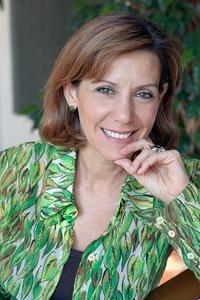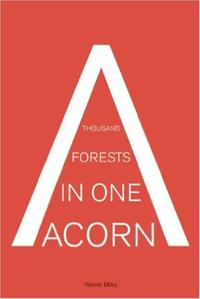 Valerie Miles is an American writer and editor who lives and works between Barcelona and Madrid, Spain. She is the co-founding editor of Granta's Spanish language magazine, whose Best of Young Spanish Language Novelists issue appeared in 2010, and author of the anthology A Thousand Forests in One Acorn (Open Letter, $19.95). She writes for the New York Times, the Paris Review, Granta, El País, La Vanguardia and La Nación. She was a curator of the Roberto Bolaño archive at the Center for Contemporary Culture in Barcelona.
Valerie Miles is an American writer and editor who lives and works between Barcelona and Madrid, Spain. She is the co-founding editor of Granta's Spanish language magazine, whose Best of Young Spanish Language Novelists issue appeared in 2010, and author of the anthology A Thousand Forests in One Acorn (Open Letter, $19.95). She writes for the New York Times, the Paris Review, Granta, El País, La Vanguardia and La Nación. She was a curator of the Roberto Bolaño archive at the Center for Contemporary Culture in Barcelona.
A Thousand Forests from One Acorn is, at 700+ pages, the most pleasurable "brick" I've read. How challenging was it to corral all of those authors? And how difficult was it to get them to choose the best of their own writing?
It was a big challenge for many reasons, both on practical and literary levels. These are some of the most accomplished writers in the language with very large bodies of work. They have plenty of engagements, ceremonies, commitments, and they are of course jealous of their writing time. And here I come along asking this tricky little question about what they consider their best pages.
But I have to say, some found it a fascinating exercise, like Javier Marías, who really stepped up to the experiment, or Juan Marsé, who at first was very reticent but in the end we had a very lively conversation about his time in Paris and the original Teresa from Last Evenings with Teresa. A few mentioned it was like spending time on the couch in a therapy session!
I had worked with a few of the writers quite a bit when I was in Alfaguara, such as Mario Vargas Llosa, Carlos Fuentes, Juan Goytisolo and Antonio Muñoz Molina. And others were already friends or acquaintances from my years as a journalist or editor, like Enrique Vila-Matas, Cristina Fernández Cubas, Edgardo Cozarinsky, Horacio Castellanos Moya and Alberto Ruy Sánchez. So I started with them, and once they were on board it wasn't so difficult to persuade other writers to engage. It was a fascinating experience, with very privileged conversations, and I'm deeply grateful to them for being game and allowing me to impinge on their time and creative process.
The interview process was also difficult because of geography. The territory in which Spanish is spoken is huge. I wanted to have personal conversations to the extent it was possible, so it took many years to sort that out, to catch authors in Barcelona or Madrid or when I was traveling to festivals. I wasn't able to meet personally with all of them, but I did with most, and I think that critical mass is important.
Some writers are averse to speaking about their own work and the miracle of the creative process, almost as if talking about it too much might jinx the whole thing. This was true of a few of them, like Eduardo Mendoza for instance, and Ramiro Pinilla or Hebe Uhart. That's why I call the section where we talk about "why" they selected these pages as their peak performance "The Torture of Doctor Johnson." He was, according to Harold Bloom, the greatest of all literary critics and to ask a writer to criticize their own work from the distance of an objective observer is nothing less than torture. I was looking for that intimate connection to writing that only the creator can offer. Do you think it would have been easier for the writers to pick the best of each other's writing?
Do you think it would have been easier for the writers to pick the best of each other's writing?
I definitely think so in many cases. It's not easy to turn the spotlight inwards and then explain something that is very private, like intentions and inspirations. But that's precisely what I think sets this book apart. It's not a book of criticism, it's like putting writers on the divan and asking them personal questions that relate to the mystery of the creative impulse. They give us some personal insight that only they know and that might help us see things in a different way when we confront their texts.
Can you give us a shortlist of recently released or forthcoming must-read authors who you are excited to see translated into English for the first time?
¡¡¡ALVARO ENRIGUE!!! His novel Sudden Death is one of the best pieces of writing I've experienced in a long time and it's out from Riverhead in February 2016. Don't miss it. I also absolutely adore the great Argentine writer Silvina Ocampo's haunting short story collection from New York Review Books, Thus Were Their Faces, and Horacio Castellanos Moya's story of alcohol-infused neurosis, The Dream of My Return. He's a splendid writer, always unpredictable and his prose is absolutely incantatory. Also there's Andrés Neuman, who has a glorious short story collection coming out from Open Letter in September, The Things We Don't Do.
The Pakistani novelist Kamila Shamsie suggested we have a year of publishing only women. If you were a publisher, which women would you publish?
I would publish Samanta Schweblin, the very powerful Argentine writer, and the reportage of another Argentine, Leila Guerriero who reminds me a little bit of Alma Guillermoprieto or, while we're still on Argentina, I could also suggest Mariana Enríquez's profile on Silvina Ocampo--she really makes the legendary grand dame come to life. There's the work of Peruvian writers Claudia Salazar and Patricia de Souza, Colombian Carolina Sanin and the Spanish writers Sonia Hernández and Elvira Navarro. I just translated Milena Busquet's novel This Too Shall Pass, which was a lot of fun, it will be coming out in May 2016 from Hogarth in the U.S. and Penguin Random House in the U.K. The works of the Venezuelan essayist Ana Nuño, Mexican poet Tedi Lopez Mills and art historian Victoria Cirlot are all brilliant. There's still a lot to do in discovering the female imagination in literature and bringing Spanish-language academics into the international conversation.
Hispabooks is committed to publishing Spanish authors in translation and University of Chicago Press just began a Latin American translation program. Is there a geographic area that's under-published?
As a matter of fact, I'm working with University of Chicago Press on Edmundo Paz Soldan's novel Norte right now. Hispabooks finally came out with the work of Andrés Barba, Javier Montes and Nico Casariego. I was with Andrés and Nico in Toronto and it was fantastic to see how the audience responded to their readings.
There's a lot going on in Peru, Bolivia and Ecuador, the Andes area, that is still untapped. I was invited to guest edit a Words Without Borders issue on Peru that will be out in September--it's burgeoning with original writing, especially reportage and narrative nonfiction. And Bolivia? Rodrigo Hasbun is a Carverian writing in Spanish--clean, tight prose, no fat. His novel has been sold in 15 different languages so you don't have to take my word for it. But I worked with him closely on a story collection I published a few years ago and it was exciting to see the spectacular reviews, he's a serious talent. And Liliana Colanzi is an emerging voice whose stories are being translated into English.
In Granta, we've dedicated special issues to Colombia and to Mexico, searching out voices and trends in literature. I think there's also a lot going on in Spain. Writers like Javier Calvo, Kiko Amat and Sebastià Jovani, whose very original short story 'The Archive' we published in Granta en español in October of last year, and it just came out in the English Granta magazine.
Deep Vellum is publishing Eduardo Berti (Argentina) and Pablo Martín Sánchez (Spain), the first two Spanish-language Oulipo authors. Have you read them? Are we in for a ride?
I have; in fact, I published a book of stories by Eduardo Berti all the way back when I was overseeing Emecé, the Argentine imprint, in 2002. He's very clever and original, infused by the French tradition. He's always been close to the inimitable Edgardo Cozarinsky, who is a writer that should be more widely translated.
I've perused Pablo Martín Sánchez without plunging in yet, but he's definitely on my list and any book published by Acantilado passes muster for me.
Is it more pleasurable for you to read in Spanish or English?
I've reached a point where reading an English translation of a Spanish original is disconcerting to me, it's like hearing two different voices and I can't help but feel confused because I can sort of re-create the original text even if I don't see it and have this sort of linguistic dissociation where I'm not paying attention to what is actually happening. Having said that, I always read any translation of Edith Grossman's with a level of devotion bordering on the lovesick.
Editor's note: After we wrapped up this interview, the Spanish novelist Rafael Chirbes died. Ms. Miles e-mailed: "He was an amazing writer and he's one of the authors in my book. He was not just talented, he was urgent and important and writing about things that nobody else dared to touch. Two of his novels will be released by New Directions." --George Carroll

